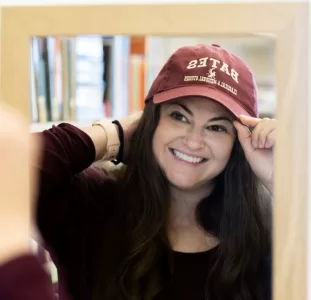
Liana J. Brent
Assistant Professor of Classical and Medieval Studies
Associations
Classical and Medieval Studies
About
Ph.D. Cornell University, Classics (Classical Archaeology)
M.A. McMaster University, Classics
B.A. McMaster University, Classics (Honors)
Liana Brent specializes in the material and social histories of ordinary individuals in the Roman world. Her research interests include Roman burial practices, Latin inscriptions, Greek and Roman sculpture, museum practices, and the history of collecting antiquities. At Bates College, Prof. Brent teaches courses on Roman Civilization, Archaeology, Slavery, Death and Burial, Pompeii, as well as Latin at all levels. In 2025, she taught an off-campus short term course, The Layers of Rome, which traveled to Italy for three weeks.
Before arriving at Bates College, Liana served as a Visiting Assistant Professor of Classics at Kenyon College (2020-2023), a Mellon Postdoctoral Fellow at the University of Pennsylvania (2019-2020), and she held a two-year pre-doctoral Rome Prize fellowship at the American Academy in Rome (2017-2019). Liana received her Ph.D. in Classics with a specialization in Classical Archaeology from Cornell University (2019), as well as a B.A. and M.A. from McMaster University in Canada (2010 and 2012).
Liana is a field archaeologist who excavates a Roman cemetery in southeast Italy. Her research has appeared in the Journal of Roman Archaeology, the Memoirs of the American Academy in Rome, Proceedings of the Theoretical Roman Archaeology Conference, and in various edited volumes published by Cambridge, Brill, and Edipuglia. She is currently working on a monograph, Corporeal Connections in Roman Burial Practices, which explores ongoing interactions between the living and the dead in Roman Italy.
In addition to her scholarly interests, Liana loves kayaking and hiking. In 2019 she hiked the Via Appia Antica (an ancient Roman road), which stretched for 350 miles from Rome to Brindisi!
Publications:
Brent, L. and T. Prowse. Forthcoming 2026. “Rural Roman Burials,” in Roman Rural Archaeology: Society, Economy and Culture, edited by G. Tol and A. Van Oyen, 137-53. Cambridge: Cambridge University Press.
Brent, L. 2024. “Drinking with the Dead: Libation Conduits from Rome’s Columbaria to the Cortile at the American Academy in Rome.” Memoirs of the American Academy in Rome 69: 153–79.
Brent, L. and T. Prowse. 2024. “Rural Labour and Identity at Vagnari in Southern Italy,” in Valuing Labour in Greco-Roman Antiquity, edited by M. Flohr and K. Bowes. Mnemosyne Supplement 481, 264–286. Leiden/Boston: Brill.
Brent, L. 2022. “The Via Appia is Easiest if Taken Slowly.” In Ways of Walking, edited by A. De Forest, 108–122, New Door Books.
Brent, L. 2020. “Sealed and Revealed: Roman Grave-opening Practices.” Journal of Roman Archaeology 33: 129–146.
Brent, L. 2020. “Flaming Torches: The Materiality of Fire and Flames on Roman Cinerary Urns,” in Cultures of Stones: An Interdisciplinary Approach to the Materiality of Stone, edited by G. Cooney, B. Gilhooley, N. Kelly and S. Mallía-Guest, 213–226. Leiden: Sidestone Press.
Brent, L. 2017. “Disturbed, Damaged and Disarticulated: Grave Reuse in Roman Italy,” in TRAC 2016: Proceedings of the Twenty-Sixth Theoretical Roman Archaeology Conference, edited by R. Cascino, F. De Stefano, A. Lepone and C.M. Marchetti, 37–50. Rome: Edizioni Quasar.
Brent, L. and T. Prowse. 2014. “Grave Goods and Patterns of Distribution in the Vagnari Cemetery,” in Beyond Vagnari: New Themes in the Study of South Italy, edited by A.M. Small, 99–109. Bari: Edipuglia.
Photo by Phyllis Graber Jensen
Expertise
Current Courses
Winter Semester 2026
Death and Burial in Ancient Rome
This course will examine the historical and archaeological aspects of death and burial in the Roman world from c. 150 BCE – 300 CE, in order to understand how the Romans cared for, disposed of, and commemorated the dead. We will explore culturally-specific attitudes to death, grief, mourning and f…
The Archaeology of Pompeii
Pompeii, often referred to as a city frozen in time, was buried by the eruption of Mount Vesuvius in 79 CE. From its exceptional state of preservation, Pompeii provides unparalleled insight into daily life in an ancient Roman town. This seminar delves into the fundamental methods and theories of the…
Senior Thesis
Required of all majors, the thesis involves research and writing of an extended essay in classical and medieval studies, following the established practices of the field, under the guidance of a supervisor in the classical and medieval studies program. Students register for CMS 458 in the winter sem…
Elementary Latin II
A continuation of LATN 101. Prerequisite(s): LATN 101.